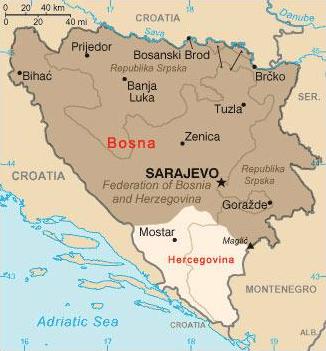Former U.S. President Donald Trump has recently weighed in on the enduring challenges of Bosnia and Herzegovina’s peace process, suggesting new approaches to address the country’s entrenched political divisions. As Bosnia continues to grapple with the unresolved tensions stemming from the 1995 Dayton Accords, Trump’s proposals have sparked debate over the potential for American-led initiatives to revitalize a stalled peace agreement. This article examines how Trump’s unconventional ideas could influence the fragile post-war framework and what implications they hold for the future stability of the Balkans.
Reevaluating the Dayton Agreement’s Structural Weaknesses to Foster Lasting Stability
The Dayton Agreement, though instrumental in halting outright conflict, has entrenched a complex web of ethnic divisions that continue to hinder Bosnia’s political and social progress. By institutionalizing power-sharing based on ethnic quotas, the deal inadvertently fosters paralysis within the central government and perpetuates nationalist agendas. This structure obstructs effective governance, limits accountability, and marginalizes citizens who do not neatly fit into the prescribed ethnic categories. Without reforms addressing these foundational flaws, lasting stability remains elusive as political leaders leverage the system to maintain their positions rather than pursue genuine national unity.
Addressing these issues requires a bold reconfiguration of the political framework that promotes inclusivity and functional governance. Key proposals include:
- Replacing rigid ethnic quotas with mechanisms that encourage cross-community cooperation and representation based on civic identity rather than ethnicity.
- Empowering central institutions to make decisions that override local ethnonationalist vetoes, thus streamlining policy implementation.
- Promoting judicial reforms aimed at enhancing the independence and effectiveness of national courts to safeguard minority rights.
| Structural Issue | Impact | Potential Reform |
|---|---|---|
| Ethnic Power-Sharing | Governance gridlock | Introduce civic-based representation |
| Entity Veto Rights | Policy deadlock | Centralize critical decision-making |
| Weak Judiciary | Limited minority protections | Enhance judicial independence |
Enhancing Administrative Cohesion through Targeted Policy Reforms
To address the persistent administrative fragmentation in Bosnia, a focused overhaul of existing policies is essential. This includes streamlining governance frameworks that currently favor ethnic divisions over functional cooperation. Key steps would involve reducing bureaucratic redundancies across entities and instituting mechanisms for joint decision-making that transcend ethnic lines. By fostering a culture of shared responsibility among regional and state institutions, Bosnia can move toward a more unified administrative apparatus capable of delivering consistent public services.
Concrete policy reforms should prioritize the following:
- Harmonization of legal frameworks to eliminate contradictory regulations between the entities
- Establishment of cross-entity oversight bodies to ensure accountability and coordination
- Investment in digital governance platforms to facilitate transparency and communication
Such targeted reforms would not only ease administrative deadlocks but also lay the groundwork for sustainable economic and social development in a complex post-conflict environment.
| Area of Reform | Current Challenge | Proposed Solution |
|---|---|---|
| Legal Consistency | Conflicting entity laws | Unified regulatory framework |
| Governance Coordination | Fragmented authority | Joint decision-making councils |
| Transparency | Opaque bureaucratic processes | Digital platforms for public oversight |
Leveraging International Partnerships to Support Sustainable Economic Development
International cooperation plays a pivotal role in addressing the complexities hindering Bosnia’s path to sustainable development. Strategic partnerships with global institutions and foreign governments can inject much-needed expertise, financial resources, and technological advancement into the region. By aligning local initiatives with broader international frameworks-such as the United Nations Sustainable Development Goals (SDGs) or EU integration policies-Bosnia can accelerate its recovery and foster lasting economic stability. Key areas for collaboration include:
- Infrastructure modernization to improve connectivity and trade
- Capacity building in governance and institutional transparency
- Investment in renewable energy and environmental protection
- Promotion of cross-border cooperation to stimulate regional markets
These partnerships must be tailored to Bosnia’s unique socio-political landscape, ensuring that external support empowers local stakeholders rather than imposing solutions. To visualize the potential impact, consider the following simplified overview of targeted sectors supported by international aid:
| Sector | International Support Focus | Expected Outcome |
|---|---|---|
| Transport | Road and railway upgrades | Enhanced trade flow |
| Governance | Anti-corruption programs | Increased investor confidence |
| Energy | Renewable energy projects | Reduced carbon footprint |
| Education | Vocational training | Skilled workforce development |
Concluding Remarks
As Bosnia continues to grapple with the challenges of its fragile peace framework, the prospect of external intervention-such as proposals associated with former President Donald Trump-adds a complex dimension to ongoing debates about the country’s future. While any potential reforms would require careful consideration of Bosnia’s intricate ethnic and political landscape, the discussion underscores a broader recognition that the Dayton Agreement, now nearly three decades old, may no longer suffice to ensure lasting stability. Whether Trump’s ideas gain traction or not, the imperative remains clear: meaningful dialogue and innovative solutions are essential to address the persistent shortages in governance and unity that define Bosnia today.
















